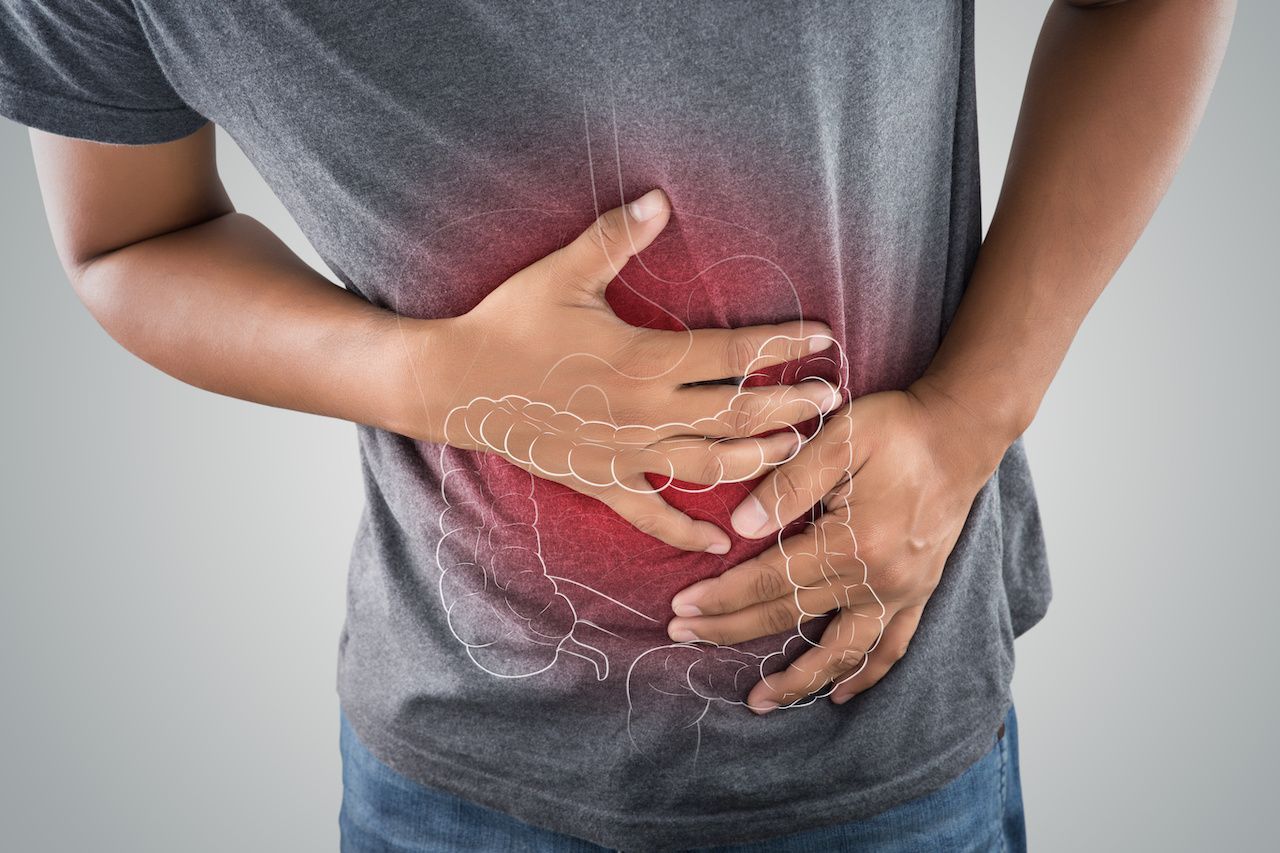- Center on Health Equity & Access
- Clinical
- Health Care Cost
- Health Care Delivery
- Insurance
- Policy
- Technology
- Value-Based Care
Safety, Efficacy of Adalimumab Biosimilar GP2017 Similar to Originator in IBD
Patients with inflammatory bowel disease (IBD) receive additional evidence on the safety and efficacy of adalimumab biosimilar GP2017 treatment.
This article originally appeared on The Center for Biosimilars®.
Man with stomach pain illustrated by intestines image with red color | Image credit: eddows - stock.adobe.com

A study confirmed the effectiveness and safety of GP2017 in patients with inflammatory bowel disease (IBD) who were naïve to adalimumab or switched from the originator (Humira) or another adalimumab biosimilar.
The observational, multicenter, retrospective study was conducted in 2 IBD centers in Northern Italy by analyzing patients with IBD, an umbrella term for Crohn disease (CD) and ulcerative colitis (UC). Data surrounding GP2017 has been scarce, especially in patients with IBD, since its July 2018 European Medicines Agency (EMA) approval was supported by data testing the product in plaque psoriasis. GP2017 (Hyrimoz/Hefiya) is 1 of 10 EMA-approved adalimumab biosimilar. In the United States, Hyrimoz is 1 of 9 approved, only 8 of which have launched.
Participants included patients with a diagnosis of CD or UC, ongoing or previous therapy for GP2017, and at least 6 months of follow up after beginning the GP2017. The patients were administered subcutaneous injections of 160 mg at baseline, 80 mg at 2 weeks, followed by 40 mg maintenance doses every 2 weeks for patients naïve to adalimumab. However, patients who switched from the originator or from another biosimilar received a standard maintenance dose of 40 mg every 2 weeks.
Overall, the study included a total of 72 patients with an IBD diagnosis. GP2017 was administered to 29 patients (40.3%) as the first form of adalimumab therapy. There were 33 patients that were first treated with the adalimumab originator (45.8%) and 10 who were initially treated with a different adalimumab biosimilar (13.8%).
Prior to GP2017 treatment, 5 patients reported clinical remission (17.2%), 16 had mild disease activity (55.1%), and 8 communicated moderate-to-severe activity (27.6%). After 6 months, 10 of the 29 treated with GP2017 were considered in remission (34.5%), 17 had mild activity (58.6%), and 8 had moderate-to-severe activity (27.6%). Following 12 months, 17 patients concluded remission (58.6%), 9 reported mild activity (31%), and only 1 patient had moderate-to-severe activity present (3.5%). There were 5 patients in remission at baseline, 10 patients after 6 months (P = .0005) and 17 patients noted remission after 12 months (P = .001).
Overall, 33 patients were switched from the originator to GP2017. When first administered, 25 patients reported clinical remission (75.8%), 6 were in mild activity (18.2%), and 2 had moderate-to-severe activity present (6%). The following 6 months included 26 patients reaching remission (78.8%), 4 with mild activity (12.1%), and only 1 out of 33 had moderate-to-severe activity (3%). After the 12-month follow-up period ,26 patients were in clinical remission (78.8%), 2 had mild activity (6.1%), and 0 patients had moderate-to-severe activity.
Regarding the 10 participants who switched from another adalimumab biosimilar to GP2017, at baseline, 6 patients were in clinical remission, 3 had mild activity present, and only 1 had moderate-to-severe activity. At 6-months, 7 patients were in remission, 2 had mild activity, and 1 patient had moderate-to-severe activity. At 12 months, 7 patients were in remission, 2 had mild activity, and 0 patients had moderate-to-severe activity.
Overall, 11 patients experienced nonserious side effects, including headache, allergic reactions, arthralgia, and cutaneous manifestations, in line with those identified for the originator. Additionally, 9 patients discontinued treatment, mainly due to adverse events or secondary failure.
Study limitations surrounded the observational data collection potentially influenced by missing information or demographics, absence of certain procedures, lack of control groups, and smaller sample sizes for UC compared to patients with CD. Statistics could be affected regarding the subgroup sample size of patients who switched from other adalimumab biosimilars.
The author stated, “Moreover, the retention rate and safety profile are comparable to those present in the literature regarding the originator, justifying the feasibility to switch from the originator to a biosimilar or from biosimilar to biosimilar.”
Reference
Vernero M, Bezzio C, Ribaldone DG, et al. Efficacy and safety of adalimumab biosimilar GP2017 in patients with inflammatory bowel disease. J Clin Med. 2023;12(21):6839. doi:0.3390/jcm12216839
Quality of Life: The Pending Outcome in Idiopathic Pulmonary Fibrosis
February 6th 2026Because evidence gaps in idiopathic pulmonary fibrosis research hinder demonstration of antifibrotic therapies’ impact on patient quality of life (QOL), integrating validated health-related QOL measures into trials is urgently needed.
Read More
